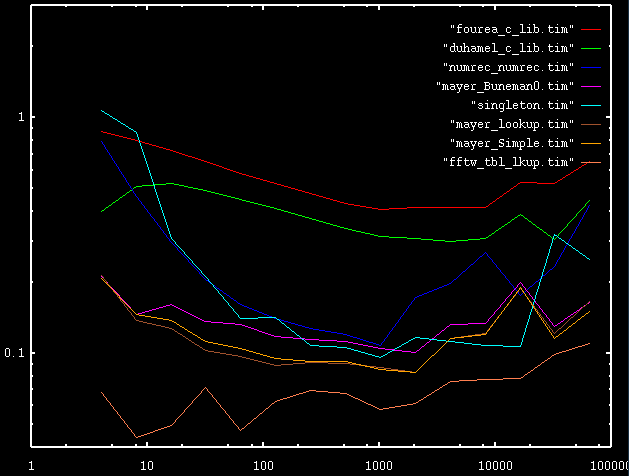Performance summary
[under construction - units and processor info (some early 90's sparc) will be included when I look them up.]

-----------------
Description of FFT algorithms compared.
numrec
A straightforward radix-2 FFT
Source: "Numerical Recipies in C";
duhamel
"A Duhamel-Hollman split-radix dif fft"
by: Dave Edelblute, edelblut@cod.nosc.mil, 05 Jan 1993 [...]
Ref: Electronics Letters, Jan. 5, 1984"
Source: periodic posting on comp.benchmarks
fourea
"adapted from subroutine FOUREA listed in Programs for Digital
Signal Processing [...] edited by Digital Signal Processing
Committee [...] IEEE Acoustics Speech and Signal Processing
Committee [...] Chapter 1 Section 1.1 Page 1.1-4,5"
Source: comp.dsp 02/04/93; by pe93009@black.ox.ac.uk (Ted Wong)
singleton
"Singleton's mixed radix algorithm"
Source: From edu/math/msdos/modelling on wuarchive.wustl.edu
Translated to C by: Javier Soley, FJSOLEY@UCRVM2.BITNET
sorensen
my C translation of the code Henrik Sorensen posted here.
Source: "Real-valued fast Fourier transform algorithms", IEEE
Tran. ASSP, Vol. ASSP-35, No. 6, pp. 849-864, June 1987
(My C translation included in the following posting)
mayer-*
All my routines are wrappers around a fast Hartley transform.
Source: the following posting.
---------------------------------------------------------------------------
A few people asked me via email about the trig algorithm I used: I'll try to look up the reference to the trig algorithm I was using; but I think I lost it somewhere in storage. It works by manipulating a log2(n) sized table of trig values. Each newly generated value is for an angle which lies exactly halfway between two angles whose trig values are known. I think the identity is something like
sin( (w+v)/2 ) = (sin(w) + sin(v)) * sec(v-w) / 2
although I might be wrong about the argument inside the sec()
function. You can start with a table of cos(pi),cos(pi/2),cos(pi/4),
cos(pi/8)...., and everytime you generate a new value you can
overwrite one which you no longer need (to avoid excessive memory
usage). This takes less floating point math than any of the other
trig generating algorithms I know of; but requires a bunch of integer
math to determine which value can be overwritten. It is probably only
faster on systems which emulate floating point math; but it is
considerably more stable than other common methods.
I'll try to find and mention the reference in a future posting.
--------------------------------------------------------------------------- Accuracy and Noise of FFT algorithms.
An earlier discussion I had on comp.benchmarks people were discussing possible tradeoffs between speed and accuracy. The amount of noise generated by various FFT algorithms varies by a factor of about 1e10! However, as shown in the table below, this is not all that closely correlated to the speed of the algorithm.
In reality, noise added by any of these FFTs probably only matters if you are doing zillions of forward and reverse transforms; but some will argue that a good FFT should have very low noise.
One significant component of errors in FFTs is the trig algorithm used. Avoiding recursively successive calculating trig functions can reduce accumulated errors by about a factor of 5. Unfortunatelly C library functions are too slow for this purpose. See my code in the next posting for a number of compromise trig algorithms.
algo trig N time ssq-errors fourea-real ;c_lib 65536 : 3.48 2.19e-12 fourea ;c_lib 65536 : 3.45 2.64e-11 duhamel ;c_lib 65536 : 2.53 4.63e-21 numrec ;numrec 65536 : 2.35 9.13e-14 mayer-rad4 ;c_lib 65536 : 2.08 1.79e-21 *(all library functions) sing ;sing 65536 : 1.68 5.22e-19 mayer-rad4 ;Buneman2 65536 : 1.52 2.46e-21 *(half-angle algorithm) mayer-rad4 ;Simple 65536 : 1.51 8.16e-21 *(recursively generated) nrec_real ;numrec 65536 : 1.04 5.39e-19 sing_real ;sing 65536 : 0.987 ???????? sorensen-r ;n-rec 65536 : 0.855 1.83e-20 mayer-real ;Buneman2 65536 : 0.765 1.78e-21 mayer-fht ;Buneman2 65536 : 0.707 2.46e-21
Note that the wierd trig algorithm reduces errors by almost a factor of 4 with negligable performance cost.
----------------------------------------------------------------------------
Ron Mayer
rmayer@digitalmarket.com
Various alternatives for FHT and FFT algorithms, including those benchmarked on FFTW's page.